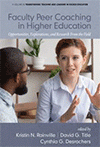
Faculty Peer Coaching in Higher Education
Opportunities, Explorations, and Research from the Field
Edited by:
Kristin N. Rainville, Sacred Heart University
David G. Title, Sacred Heart University
Cynthia G. Desrochers, California State University, Northridge
A volume in the series: Transforming Teaching and Learning in Higher Education. Editor(s): Kristin N. Rainville, Sacred Heart University. David G. Title, Sacred Heart University. Cynthia G. Desrochers, California State University, Northridge.
Published 2023
Peer Coaching is a collaborative, reciprocal practice where faculty members observe, reflect, and improve their instructional practices with the goal of improved learning for all students. This edited book includes chapters describing faculty peer coaching initiatives in universities world-wide. Section one includes chapters that give an overview of what faculty peer coaching is and what the benefits of faculty peer coaching can be. The second section of the book explores the theoretical and practical implications of engaging in faculty peer coaching and the trust and vulnerability that comes along with opening up your instructional practices to a colleague. Section three of the book includes several examples of peer coaching initiatives across various disciplines in higher education settings. Section four situates peer coaching in the broader institutional framework. This book is a must for leaders of faculty development initiatives, directors and staff from teaching & learning centers, department chairs, faculty, graduate students, deans, student services staff, chief academic officers, and educational consultants.
CONTENTS
Introduction. SECTION I: Overviews of Peer Coaching. Peer Coaching in Higher Education: A Conceptual Review of the Literature, Heather Kanuka and Cheryl Sadowski. The Efficiency and Long-Term Benefits of Faculty Peer Coaching in Higher Education, Cathryn Neiswender. Developing Faculty as Self-directed Learners through Cognitive Coaching, Süleyman Davut Göker and Mübeher Ürün Göker. SECTION II: Trust and Vulnerability. Creating a Culture of Pedagogical Innovation through Cultivating Trust and Safety in Faculty Peer Coaching, Christina Fabrey, Heather Keith, and Jennifer Guinn Sellers. When Interest is not Enough: Participant Anxieties in the Peer Coaching Process, Jeff Naftzinger and Anna Vaughn. The Value of Culturally-Informed and Strengths-Based Faculty Peer Coaching, Sonia Ramrakhiani, Daniel J. Almeida, Andrew M. Byrne, Victoria Bhavsar, and Rudy J. Sanchez. SECTION III: Models of Peer Coaching/Examples from the Field. Using the Science of Fair Process to Build and Deliver a Faculty Peer-Coaching Program, Heather Ranson and Mark Colgate. Peer Coaching for Medical Educators: Teaching Theory Transformed Into Practice, Anne C. Gill and Sandra B. Haudek. Exploring the Depth of a Pedagogical Framework’s Implementation and Its Relationship to Peer Coaching for a Successful College Accreditation in Oman, Cynthia G. Desrochers, Yasser Fouad Selim, and Chaker Mhamdi. Impact of Peer Coaching to Prepare Health Professions Faculty for Interprofessional Education and Practice, Sofía Curdumí Pendley and Sandy Pais Narciso-Owen. Faculty Peer Coaching in Transdisciplinary, Experiential, Problem-Focused Learning Contexts, Eleanor Louson, William F. Heinrich, Erica J. Lewis, Patrice M. Ludwig, Seán McCarthy, Nick Swayne, and Tatjana Titareva. Strategies for Navigating Team Teaching Hurdles: Best Practices in Peer Coaching to Enhance Teaching and Learning, Kristen L. Helms, Kimberly B. Garza, Lindsey E. Moseley, and Channing R. Ford. Transdisciplinary Peer Coaching: Pairing Social Work and Education Faculty to Transform Practice, Deirdra Preis, Frank Martignetti, Suzanne Marmo, Jason Ostrander and Jillian Schreffler. Themed Teaching Squares as a Peer Coaching Strategy That Supports Implementation of New Instructional Strategies, Mandie Mauldin. The Benefits of Peer Coaching at Every Career Stage, Whitney Ross Manzo and Julie A. Schrock. SECTION IV: Peer Coaching as Part of a Broader Institutional Framework. Improving Instruction Through a Tiered System of Peer Observation and Coaching, Michael J. McGuire and Melanie Burdick. Brave New World: Fostering Collaborative Peer Coaching for Teaching Transformation, Taimi Olsen, Laura Cruz, and Marina Smitherman. Faculty Peer-Coaching – A catalyst to Improve Academic Program Quality, Zeenar Salim, Faisal Notta, Anil Khamis, and Tashmin Khamis. Transformative Peer Coaching: A Critical Communication Approach to New Faculty Onboarding, Priya Raman and Deanna L. Fassett. Considerations for Designing and Planning a Faculty Peer Coaching Initiative, Kristin N. Rainville, Cynthia G. Desrochers, and David G. Title.
-
Paperback979-8-88730-450-2
Web price: $62.04 (Reg. 72.99)
-
Hardcover979-8-88730-451-9
Web price: $89.24 (Reg. 104.99)
- eBook979-8-88730-452-6

- EDU053000 - EDUCATION: Training & Certification
- EDU032000 - EDUCATION: Leadership
- EDU015000 - EDUCATION: Higher
-
 Expanding the Vision of Faculty Learning Communities in Higher Education
Emerging Opportunities for Faculty to Engage Each Other in Learning, Teaching, and Support
Expanding the Vision of Faculty Learning Communities in Higher Education
Emerging Opportunities for Faculty to Engage Each Other in Learning, Teaching, and Support
-
 Faculty Learning Communities
Communities of Practice that Support, Inspire, Engage and Transform Higher Education Classrooms
Faculty Learning Communities
Communities of Practice that Support, Inspire, Engage and Transform Higher Education Classrooms
-
 Faculty Learning Communities
Working Towards a More Equitable, Just, and Antiracist Future in Higher Education
Faculty Learning Communities
Working Towards a More Equitable, Just, and Antiracist Future in Higher Education
-
 Faculty Peer Coaching in Higher Education
Partnerships to Support Improved Instructional Practices
Faculty Peer Coaching in Higher Education
Partnerships to Support Improved Instructional Practices
-
 Institutional Diversity in American Postsecondary Education
Institutional Diversity in American Postsecondary Education
-
 Promoting Equitable Classroom Practices in Higher Education
Approaches Beyond Curriculum
Promoting Equitable Classroom Practices in Higher Education
Approaches Beyond Curriculum
-
 The Handbook for Aspiring Higher Education Leaders
The Handbook for Aspiring Higher Education Leaders

